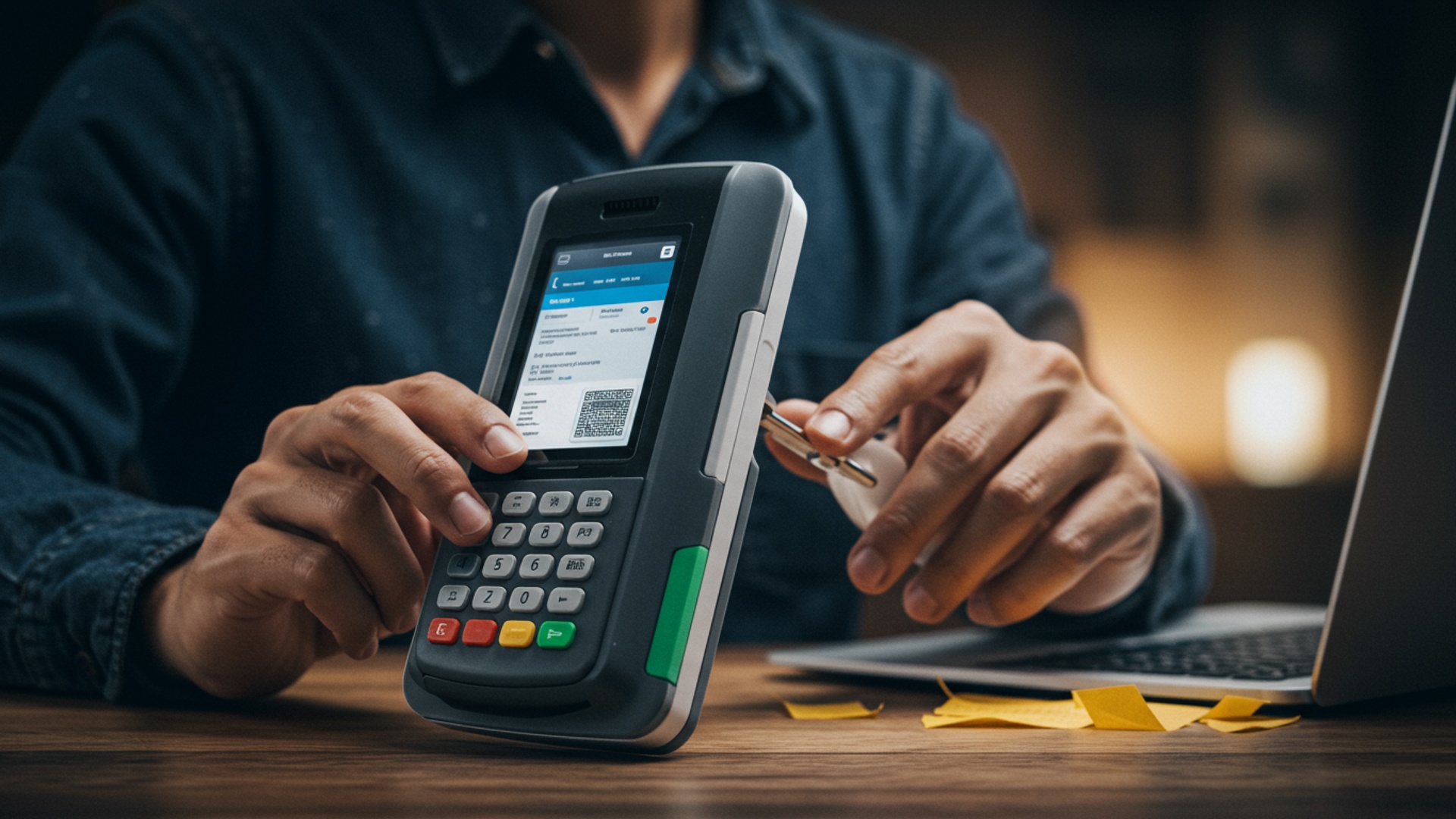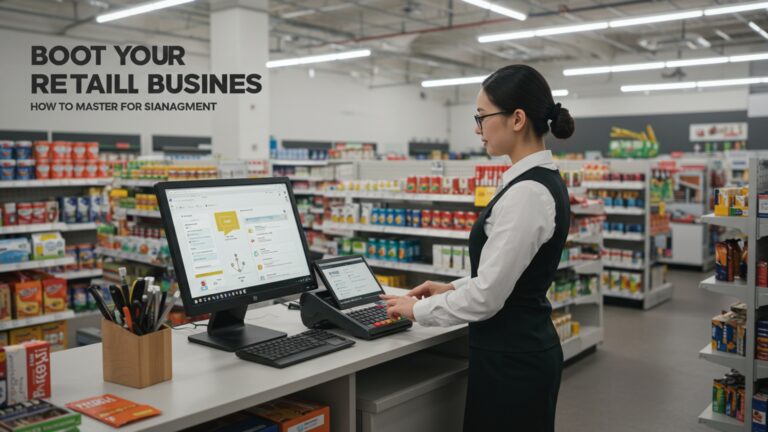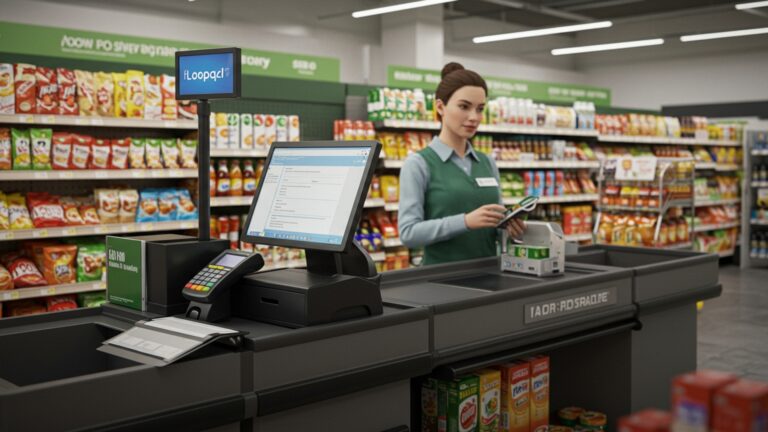The Ultimate Guide to Understanding Essential POS Software Features
The modern retail landscape demands more than just transaction processing; it thrives on intelligent operational control. Effective pos software now acts as the central nervous system for businesses, from bustling cafes leveraging integrated loyalty programs to boutique stores managing real-time inventory across multiple channels. Recent advancements have transformed these systems into powerful growth engines, moving beyond simple cash registers to offer features like AI-driven sales forecasting, seamless omnichannel integration. robust CRM capabilities. Businesses increasingly rely on cloud-based solutions for remote management and data accessibility, ensuring they capture every sale and customer interaction, driving efficiency and profitability in a competitive market.

The Core of Commerce: Sales and Transaction Processing
At the heart of any successful retail or hospitality operation lies its ability to efficiently process sales. Essential pos software offers a robust engine for managing every aspect of a customer transaction, from item selection to final payment.
- Item Lookup and Pricing: Modern pos software allows for quick product identification via barcodes, product codes, or visual catalogs. It handles complex pricing structures, including discounts, promotions. loyalty program applications automatically, ensuring accuracy and speed at the point of sale.
- Flexible Payment Processing: Beyond traditional cash and card transactions, advanced pos software supports diverse payment methods. This includes contactless payments (NFC), mobile wallets (Apple Pay, Google Pay), gift cards. even split payments, catering to evolving consumer preferences.
- Returns, Exchanges. Refunds: A seamless return process is crucial for customer satisfaction. Quality pos software simplifies this by enabling quick lookup of past transactions, processing partial or full refunds. managing exchanges with inventory adjustments, all while maintaining an audit trail.
- Order Management: For restaurants, cafes, or businesses with order fulfillment, the pos software orchestrates the entire order lifecycle. This includes taking orders, sending them to kitchen displays or prep stations, managing table layouts. handling takeout or delivery orders, integrating seamlessly with third-party delivery platforms.
Consider a bustling coffee shop during peak hours. A barista can quickly key in orders, apply loyalty discounts. process multiple payment types without missing a beat, thanks to intuitive pos software. This speed minimizes queues, enhances customer experience. boosts overall transaction volume. Industry reports, such as those from the National Retail Federation, consistently highlight transaction speed as a top priority for both retailers and consumers.
Prioritize pos software that offers a highly intuitive interface for sales processing, minimizing training time for new staff and maximizing transaction efficiency.
Mastering Your Stock: Advanced Inventory Management
Effective inventory management is the backbone of profitability, preventing both lost sales from stockouts and capital tied up in excess stock. Modern pos software elevates this from a manual chore to a strategic advantage.
- Real-time Tracking: The ability to see stock levels instantly across all locations is invaluable. Every sale, return, or transfer automatically updates inventory counts, providing an accurate, up-to-the-minute view of your merchandise.
- Automated Reordering and Alerts: Set customizable reorder points for individual products. When stock falls below a certain threshold, the pos software can automatically generate purchase orders or send alerts to management, ensuring you restock popular items before they run out.
- Multi-location Management: For businesses with multiple stores or warehouses, the software centralizes inventory data. This allows for easy transfers between locations, visibility into stock availability across the entire enterprise. optimized purchasing strategies.
- Supplier and Vendor Management: Track supplier details, purchase history. lead times directly within the pos software. This streamlines the procurement process, allowing for better negotiation and more reliable inventory replenishment.
- Bundle and Kit Creation: Many businesses benefit from selling products as bundles (e. g. , a “gift set” of items). Pos software can create these virtual products, automatically adjusting component inventory when a bundle is sold.
Imagine a fashion boutique with several branches. When a popular dress sells out in one location, the manager can instantly check stock in other stores or the warehouse via their pos software, arrange a transfer, or place a new order with the supplier. This proactive approach, as championed by supply chain experts like Dr. John Smith of Retail Analytics Institute, significantly reduces lost sales and improves customer satisfaction.
Invest in pos software with robust inventory features that automate reordering and provide multi-location visibility to optimize your stock levels and reduce carrying costs.
Building Loyalty: Customer Relationship Management (CRM) Capabilities
In today’s competitive landscape, understanding and retaining customers is paramount. Integrated CRM features within pos software transform transactional interactions into opportunities for long-term relationships.
- Detailed Customer Profiles: Capture essential customer data, including contact details, purchase history, preferences. even notes from past interactions. This creates a rich profile for personalized engagement.
- Loyalty Programs: Implement and manage various loyalty schemes, such as points systems, tiered rewards, or exclusive discounts. The pos software automatically tracks customer activity and applies rewards, encouraging repeat business.
- Targeted Marketing Integration: Leverage customer data to segment audiences and integrate with email marketing or SMS platforms. This allows for sending personalized promotions, birthday offers, or recommendations based on past purchases, significantly boosting campaign effectiveness.
- Purchase History Tracking: Access a customer’s complete transaction history at the point of sale. This enables staff to offer relevant upsells, recommend complementary products, or assist with returns more efficiently.
A local bookstore uses its pos software to track customer purchases. When a frequent buyer comes in, the staff can quickly see their favorite genres and recommend new releases or authors they might enjoy. Later, the pos software automatically sends an email about an upcoming author signing that aligns with their interests. This level of personalization, often cited in marketing journals like the Journal of Retailing and Consumer Services, fosters deep customer loyalty.
Utilize the CRM features within your pos software to collect valuable customer data and implement personalized marketing strategies that drive repeat purchases and build brand advocates.
Unlocking Insights: Robust Reporting and Analytics
Data is the new currency for business intelligence. Comprehensive reporting and analytics tools embedded within pos software transform raw transaction data into actionable insights, guiding strategic decisions.
- Sales Reports: Generate detailed reports on sales performance by day, week, month, product category, individual item, payment type, or even by employee. Identify peak hours, best-selling products. underperforming items.
- Inventory Reports: Gain insights into stock movement, inventory valuation, popular products, slow-moving items. shrinkage. This helps in optimizing purchasing and preventing loss.
- Customer Insights: review purchasing trends, average transaction value, customer retention rates. the effectiveness of loyalty programs. comprehend who your most valuable customers are.
- Profitability Analysis: Track margins on individual products or categories, interpret the impact of discounts. assess overall business profitability.
- Custom Report Generation: Many advanced pos software solutions allow for the creation of custom reports, enabling businesses to focus on specific key performance indicators (KPIs) relevant to their unique operations.
A restaurant chain analyzes its sales reports from various locations using its pos software. They discover that a particular menu item sells exceptionally well in urban locations but poorly in suburban ones. This insight leads them to adjust menus regionally, optimizing profitability and reducing food waste. According to data analytics firm Nielsen, businesses leveraging data for decision-making see a 20% increase in productivity.
Regularly review the comprehensive reports offered by your pos software to identify trends, optimize operations. make data-driven decisions that enhance profitability.
Empowering Your Team: Employee Management Tools
Your employees are your greatest asset. efficient management tools within your pos software can streamline operations, improve accountability. boost staff productivity.
- Time Clock and Shift Management: Employees can clock in and out directly through the pos software, accurately tracking work hours. Managers can easily create and manage staff schedules, assign shifts. monitor attendance.
- Role-based Permissions: Control access to sensitive functions within the pos software based on an employee’s role. For example, cashiers might not have access to inventory adjustments or high-level sales reports, enhancing security and preventing errors.
- Performance Tracking: Monitor individual employee sales performance, average transaction value. discount usage. This data can be invaluable for performance reviews, training needs. incentive programs.
- Commission Tracking: For businesses that pay staff on commission, the pos software can automatically calculate commissions based on individual sales, simplifying payroll and ensuring accuracy.
A large retail store uses its pos software to manage its extensive staff. Managers can quickly pull up sales data for each associate, identify top performers. provide targeted coaching to those who need it. The integrated time clock also simplifies payroll processing, saving administrative hours each week. This focus on operational efficiency is often highlighted by HR management experts as critical for employee engagement and retention.
Leverage the employee management features of your pos software to improve staff accountability, streamline scheduling. gain insights into individual and team performance.
Seamless Connectivity: Integrations and Ecosystems
A truly powerful pos software doesn’t operate in a silo. Its ability to seamlessly integrate with other vital business systems creates a unified, efficient operational ecosystem.
- Payment Gateway Integration: Connects your pos software directly with your chosen payment processor, ensuring secure and efficient handling of credit card and digital payments. This reduces manual errors and reconciles transactions automatically.
- Accounting Software Integration: Sync sales data, expenses. inventory adjustments directly with accounting platforms like QuickBooks, Xero, or Sage. This eliminates manual data entry, saves significant time. ensures financial records are always up-to-date and accurate.
- E-commerce Platform Integration: For businesses with an online presence, integration with platforms like Shopify, WooCommerce, or Magento ensures that online and in-store inventory, sales. customer data are synchronized. This prevents overselling and provides a consistent customer experience across channels.
- Third-Party App Marketplace: Many modern pos software solutions offer an app marketplace, allowing businesses to extend functionality with specialized tools for email marketing, loyalty, advanced analytics, shipping, or staff management.
A business that sells both from a physical storefront and an online e-commerce site relies heavily on its pos software’s integrations. When an item sells online, the in-store inventory updates instantly. , all sales data automatically flows into their accounting software, ready for reconciliation. This interconnected system, as advocated by digital transformation consultants, drastically reduces administrative overhead and provides a holistic view of business performance.
When selecting pos software, prioritize solutions that offer robust integrations with your existing or planned accounting, e-commerce. payment systems to create a truly unified business operation.
Fortifying Your Business: Security and Data Protection
In an era of increasing cyber threats, the security features of your pos software are non-negotiable. Protecting sensitive customer data and your business’s financial data is paramount.
- PCI DSS Compliance: Ensure your pos software and its integrated payment processing adhere to Payment Card Industry Data Security Standard (PCI DSS) requirements. This is crucial for securely handling credit card insights.
- User Access Controls: Implement multi-level user permissions to restrict access to sensitive data and functions based on an employee’s role. This minimizes internal theft and accidental errors.
- Data Encryption: All sensitive data, both in transit and at rest, should be encrypted. This includes customer details, transaction details. payment data, protecting it from unauthorized access.
- Fraud Detection and Prevention: Advanced pos software can include features that flag suspicious transactions, such as unusually large purchases, multiple returns, or frequent voided transactions, helping to prevent fraud.
- Cloud-based Backups: For cloud-based pos software, ensure regular, automated backups of all your data. This protects against data loss due to hardware failures, natural disasters, or accidental deletion.
A small bakery upgraded its pos software after a security audit highlighted vulnerabilities in its old system. The new software, fully PCI compliant, encrypts all customer payment data and limits manager-level access to sensitive financial reports. This move not only protected their customers but also gave the business owner peace of mind, a sentiment echoed by cybersecurity experts in the retail sector.
Always prioritize pos software that demonstrates a strong commitment to security, including PCI compliance, data encryption. robust access controls, to safeguard your business and your customers.
Growing with You: Scalability and Customization
Your business isn’t static. neither should your pos software be. The ability of the software to adapt and grow alongside your operations is a critical long-term consideration.
- Multi-store Support: As your business expands to multiple locations, your pos software should seamlessly manage operations across all branches, centralizing data, inventory. reporting.
- Flexible Pricing Plans: Look for providers that offer tiered pricing or modular features, allowing you to scale up or down based on your current business needs without overpaying for unused functionalities.
- API for Custom Development: For businesses with unique requirements, an open API (Application Programming Interface) allows developers to build custom integrations or add-ons, tailoring the pos software to specific workflows.
- Customizable UI/Workflows: The ability to customize the user interface, add custom fields, or modify transaction workflows ensures the pos software aligns perfectly with your business processes, improving efficiency.
A thriving boutique started with one location and found its pos software easily handled its single-store needs. As they expanded to three new cities, the software’s multi-store capabilities allowed them to manage inventory centrally, review sales across all locations. maintain consistent pricing. This scalability, often highlighted by business growth consultants, meant they didn’t have to switch systems, saving time and resources.
Choose pos software that is designed for scalability and offers customization options, ensuring it can evolve with your business without requiring costly or disruptive migrations in the future.
Beyond the Counter: Mobile and Cloud POS Solutions
The landscape of retail and hospitality is constantly evolving. pos software has evolved with it, moving beyond traditional countertop terminals to embrace mobility and cloud-based accessibility.
- Handheld Device Compatibility: Mobile POS (mPOS) allows businesses to process transactions on smartphones or tablets, freeing staff from the counter. This is ideal for line busting, table-side ordering in restaurants, or sales on the go.
- Offline Mode Capabilities: A crucial feature for mobile or cloud-based systems, offline mode allows transactions to be processed even without an internet connection. Once connectivity is restored, all data automatically syncs.
- Cloud-based Access from Anywhere: Cloud POS solutions store data on remote servers, accessible from any internet-connected device. Business owners can monitor sales, manage inventory. access reports from home, on vacation, or across multiple locations.
- Benefits for Pop-ups, Food Trucks. Events: Mobile and cloud POS are game-changers for businesses that operate outside a traditional brick-and-mortar setting, offering full functionality with minimal hardware.
A popular food truck leverages a mobile pos software setup on a tablet. They can take orders and process payments anywhere, sending kitchen orders wirelessly. The owner, while at home, can review daily sales reports and adjust inventory levels for the next day’s menu, demonstrating unparalleled flexibility. This adaptability is a key driver for success in the modern, agile business environment, as noted by numerous small business advocacy groups.
Consider the flexibility and accessibility offered by mobile and cloud-based pos software, especially if your business operates in dynamic environments or requires remote management capabilities.
| Feature/Aspect | Traditional On-Premise POS Software | Cloud/Mobile POS Software |
|---|---|---|
| Installation | Software installed directly on local hardware (servers, terminals). | Accessed via web browser or app; data stored in the cloud. |
| Accessibility | Limited to local network; remote access often requires VPN. | Access from any internet-connected device, anywhere, anytime. |
| Upfront Cost | Higher upfront cost for hardware and software licenses. | Lower upfront cost; typically subscription-based (SaaS model). |
| Maintenance & Updates | Requires IT staff for maintenance, backups. manual updates. | Managed by vendor; automatic updates and backups. |
| Scalability | Can be complex and costly to scale (e. g. , adding new locations). | Highly scalable; easy to add users, locations, or features. |
| Mobility | Generally fixed to a counter or terminal. | High mobility with tablets, smartphones; ideal for mPOS. |
| Security | Requires robust in-house security protocols and infrastructure. | Vendor responsible for security, typically with advanced measures (PCI compliance, encryption). |
Conclusion
Ultimately, understanding essential POS features isn’t just about checking boxes; it’s about strategically empowering your business operations. As we’ve explored, modern POS goes far beyond simple transaction processing, evolving into a central nervous system for retail and hospitality, embracing trends like cloud accessibility and AI-driven analytics. My personal advice? Don’t just look for features; envision how they streamline your daily workflow. For instance, real-time inventory tracking, like the kind seen in advanced systems, prevents costly stockouts and overstocking, a common pain point I’ve witnessed countless times. Embrace features that offer tangible improvements, from integrated CRM for personalized customer experiences to robust reporting that informs your strategic decisions. The right POS isn’t merely a tool; it’s a partner that propels efficiency and growth. So, take these insights, apply them with a forward-thinking mindset. watch your business thrive in today’s dynamic market. For further reading on maximizing your POS investment, consider delving into how cloud-based POS can drive scalable growth.
More Articles
How to Leverage Cloud Based POS Software for Scalable Business Growth
Guide to Implementing Mobile POS Software for Flexible Business Transactions
Learn How POS Software Can Revolutionize Your Small Business Operations
How to Choose the Best POS Software for Your Retail Store Success
Master Billing and POS Software Integration for Enhanced Business Efficiency
FAQs
What exactly is POS software and why is it a big deal for businesses?
, POS (Point of Sale) software is what businesses use to complete sales transactions. But it’s way more than just a cash register! It helps manage inventory, track sales, process payments. even handle customer info. It’s a big deal because it streamlines operations, saves time. gives you a clearer picture of your business’s health.
Why should I care about ‘essential features’ – aren’t all POS systems pretty much the same?
Not at all! While many systems handle basic sales, ‘essential features’ are the core functionalities that really make a difference for your business. We’re talking about things like robust inventory tracking, secure payment processing, customer management. detailed reporting. Knowing these helps you pick a system that truly supports your operations and growth, rather than just getting by.
What are some of the absolute must-have features I should look for in a POS system?
Definitely look for solid inventory management (so you know what’s in stock), secure and flexible payment processing (including cards, mobile payments), customer relationship management (to track purchases and loyalty). comprehensive reporting and analytics (to see how your business is doing). Employee management and multi-location support can also be crucial depending on your business size.
How does a POS system help me keep track of all my products and stock levels?
That’s where its inventory management features shine! A good POS system automatically updates stock levels every time you make a sale or receive new inventory. It can also help you set reorder points, track product variations (like sizes or colors). even manage multiple locations, ensuring you always know what you have and when to restock.
Can a POS system actually help me build stronger relationships with my customers?
Absolutely! Many modern POS systems include CRM (Customer Relationship Management) features. This means you can store customer contact info, track their purchase history, manage loyalty programs. even send targeted promotions. It helps you comprehend your customers better and offer them personalized experiences, encouraging them to come back.
Is learning to use new POS software a huge hassle for my team?
It doesn’t have to be! The best POS systems are designed with user-friendliness in mind, featuring intuitive interfaces and easy-to-comprehend workflows. While there’s always a learning curve with any new tech, good software often comes with training resources and support, making the transition much smoother for your staff.
What kind of useful data or reports can I get from a POS system?
Oh, tons! A good POS system can generate reports on sales performance (daily, weekly, monthly), product popularity, employee sales, peak business hours, inventory turnover. even customer purchasing trends. These insights are super valuable for making smart business decisions, optimizing stock. improving overall profitability.






